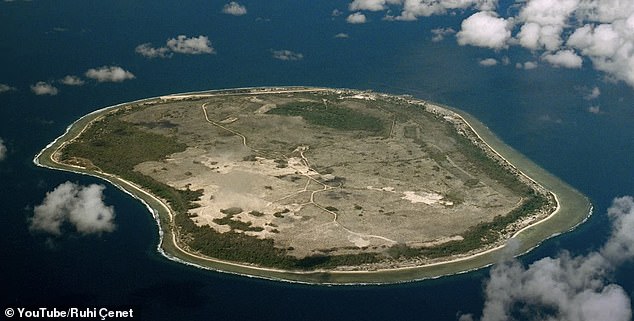A fascinating documentary transports viewers to one of the least visited countries in the world, where obesity and cigarette addiction are widespread.
Ruhi Çenet ventured to the tiny, oval-shaped island country of Nauru, which lies more than 1,800 miles northeast of Australia.
In a YouTube video detailing her trip, Ruhi discovers that the 8.1-square-mile outcrop only gets “one or two tourists” a month.
Part of the problem is the country’s remoteness. The only way to reach Nauru is by air, as the coral reefs surrounding the island prevent ships from docking.
Ruhi traveled for nearly 48 hours to get there, with a 13-and-a-half-hour flight from Istanbul to San Francisco followed by a seven-hour stopover, and then took a 13-hour flight to Nadi in the Fiji Islands with another seven-hour stopover.
A fascinating documentary transports viewers to one of the least visited countries in the world, where obesity and cigarette addiction are widespread.
The final group on the trip says they will take a four-hour flight from Fiji to Nauru’s tiny, single-runway airport.
He said 75 percent of the seats on this leg of the journey were unoccupied.
In her documentary, Ruhi reveals that Nauru was once one of the richest islands per capita due to its revenue from phosphate mining and its small population.
An article in The New York Times A 1982 report, The Richest Little Island in the World, states that ‘annual Government revenues from the sale of phosphate are at least $123 million, or more than $27,000 a year for every man, woman and child on Nauru’.
People were so rich that Ruhi says there was a “spending frenzy,” and in one part of the island he discovers dozens of supercars from that period abandoned to their fate.
A local he knows reveals that even the police were rolling in money and that one officer bought a Lamborghini before realising he was “too fat to fit in it”.
However, as predicted in the New York Times article, Nauru’s main phosphate deposits were depleted and companies found it cheaper to mine elsewhere.
Ruhi points out that due to mining, the island’s land is now unsuitable for agriculture and all food must be imported.
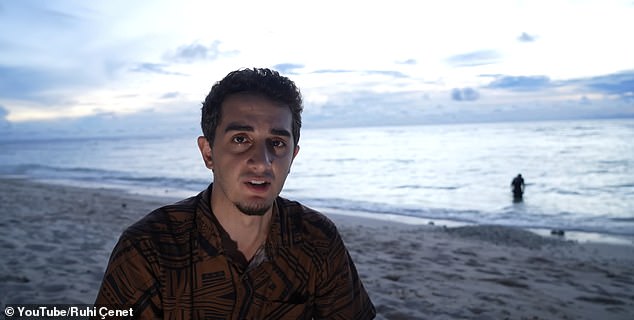
Ruhi Çenet ventured to the tiny, oval-shaped island country of Nauru, which lies more than 1,800 miles northeast of Australia.
This, he says, has contributed to the country’s obesity epidemic.
He explains: ‘In these destroyed lands where neither vegetables nor fruits can grow, processed and fatty foods have become the norm.
‘The World Obesity Federation recognises Nauru as the country with the highest rate of obesity in the world, with around 60 per cent of its citizens obese.’
In one scene, Ruhi takes a trip to a grocery store, where the shelves are mostly filled with canned goods.
Spam is said to be one of the most popular products on the island.
Meanwhile, fruit and vegetables are subject to sky-high prices, with a head of cauliflower costing AU$18.59 (US$12.45), while a whole watermelon costs AU$61.13 (US$40.95).
In addition to an unhealthy diet, Ruhi reveals that Nauru, which gained independence in 1968, also tops the charts when it comes to cigarette consumption.
According to the World Health OrganizationThe country has the highest smoking rate in the world, at 52.1 percent.
It is noted that “interestingly, women smoke slightly more than men in Nauru (52.6 percent versus 51.7 percent), which is an outlier.”
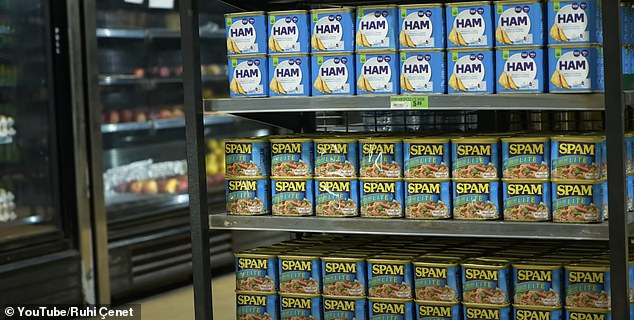
Spam is said to be one of the most popular products on the island.
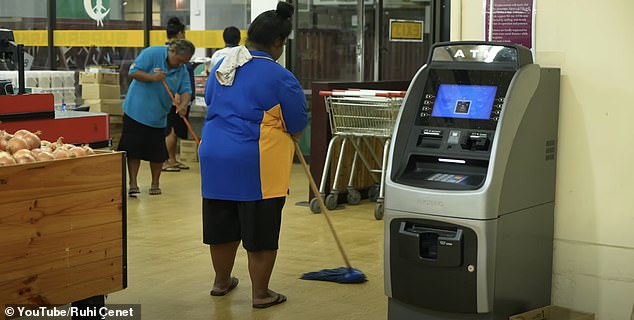
In addition to an unhealthy diet, Ruhi reveals that Nauru also tops the charts when it comes to cigarette consumption.
As for the island’s layout, Ruhi notes that there is no official capital, although Yaren is home to the legislature and several government offices.
It is also home to the country’s only police station, fire department and airport.
As he explores the small town, he manages to access the parliament building, which he says is very small and has a relaxed atmosphere.
Elsewhere in the YouTube film, Ruhi details the darker side of the island.
For two decades, asylum seekers trying to reach Australia by boat were diverted to Nauru and Ruhi says three camps were set up.
Detailing the chain of events further, he continued: ‘Around 1,000 refugees, mostly of Afghan, Iraqi and Iranian descent, were transported to Nauru and detained for an indefinite period.
‘People were forced to stay in plastic tents for years under the scorching sun, without regular access to clean water.
‘Many tried to escape inhuman and miserable conditions and an uncertain future by ending their lives.
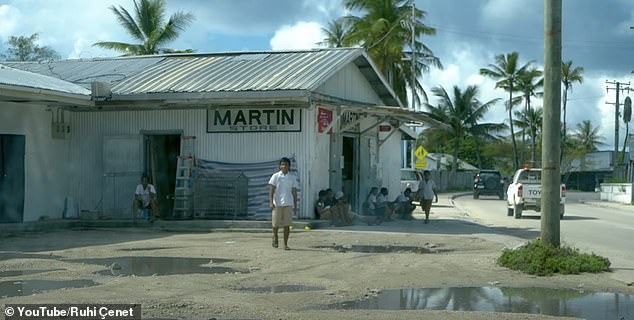
As for the island’s layout, Ruhi notes that there is no official capital, although Yaren is home to the legislature and several government offices.
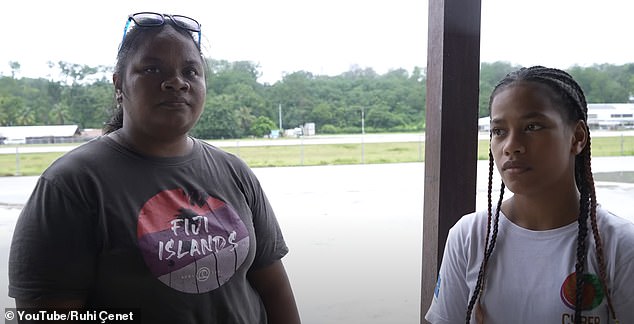
The only way to reach Nauru is by air, as the coral reefs surrounding the island make it impossible for boats to dock.
‘Those who suffered most from this situation were the children, who made up the majority of the camps.
‘Australia spent an average of $550 million each year to maintain these camps.
In other words, the Nauru government made a profit of $500,000 for every refugee held captive on the island.
During her visit to Nauru, Ruhi tries to visit the refugee camps, but finds it impossible to gain access.
He brought a drone with him on the trip, but it was confiscated by police at the airport because, he says, the government is very suspicious of media outlets investigating life there.
On the subject of scandals, Ruhi also mentions the island’s past as a haven for tax evasion and money laundering.
But it says its situation has since improved and the government has revoked licenses from hundreds of banks registered in the country.
Currently there is only one bank left on the island and the few ATMs rarely have funds.
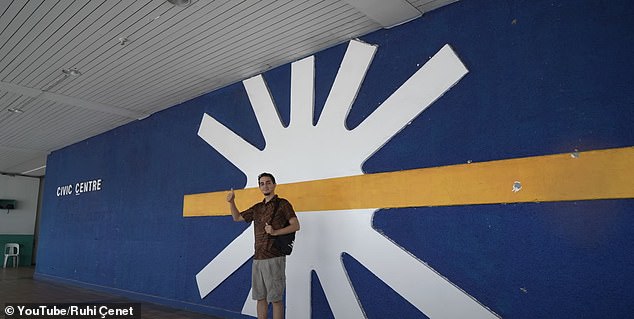
So far, Ruhi’s YouTube channel has been viewed over 36 million times and is considered by many viewers to be both “educational” and “depressing.”
For this reason, he says it is best to travel to Nauru with cash and the currency there is the Australian dollar.
Ruhi had to spend a week in Nauru exploring with the help of a local travel agency as he had to wait for the next scheduled flight to take him home.
At the end of his film, he concludes: ‘The illusion of wealth that Nauru was suddenly thrust into in the late 1960s resulted in a generation failing to understand the importance of hard work and education.
‘The government made no plans for the future and exhausted all the nation’s resources.
It seems almost impossible to build a better future here without the necessary motivation, skills and knowledge.
‘This small island with wounds that can never heal stands before us basically as a summary of what is happening in the world and as a lesson that humanity should always remember.’
His YouTube channel has been viewed more than 36 million times so far, with many viewers finding it both “educational” and “depressing.”
One commenter wrote: “What a sad story. It’s interesting to note that although they have no worries, people seem to have no dreams either. The island should be a paradise, but it’s disgusting.”
Another viewer reflected: “Nauru is, sadly, a small-scale example of what is happening all over the planet.”


